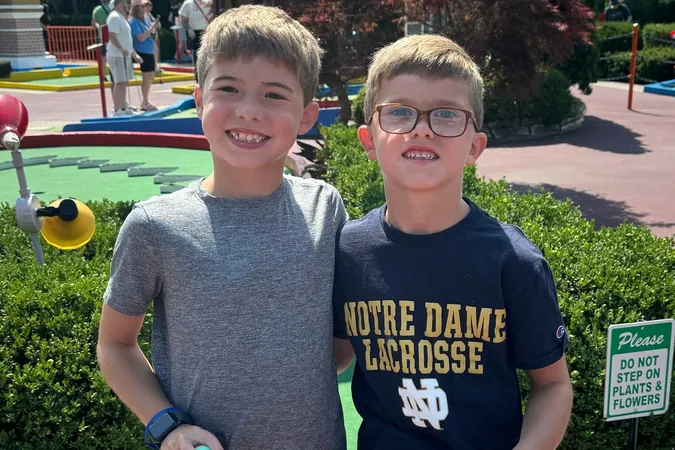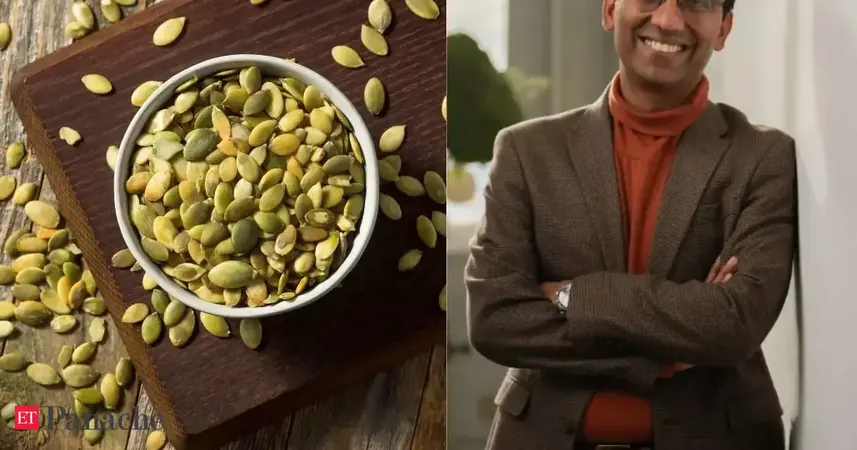
Heartbreaking Insurance Dilemma: Two Brothers, One Life-Changing Treatment Denied
2025-09-07
Author: Ting
Imagine seeing your child thrive while another suffers from the same debilitating condition. For Alison Joseph, this was her reality when her 9-year-old son Noah learned to swim while his older brother, Hunter, 10, watched from the sidelines, unable to join in due to their shared battle with Duchenne muscular dystrophy (DMD).
DMD is a severe genetic disorder that leads to muscle degeneration, primarily affecting boys. Those afflicted face grave challenges, often requiring wheelchairs by their teenage years and having a life expectancy greatly limited to the early forties.
In a twist of fate, Noah received innovative gene therapy that significantly improved his mobility, a groundbreaking treatment approved by his health insurance. However, when Hunter's application for the exact same treatment was submitted, the family was thrown into turmoil: the insurance denied them, citing it as 'not medically necessary.'
Alison, who is also a physician, described the shock and heartbreak of the situation: "It was blindsiding. They approved my other son without hesitation, and suddenly, they draw the line at Hunter?"
With the clock ticking and Hunter's condition worsening, his parents face an agonizing decision. "His muscles literally waste away each day. It's devastating to consider that the insurance is denying him this treatment, which could improve his quality of life. They are squandering precious time that he could be using to fight this disease," Alison said.
The brothers were diagnosed with DMD in 2017, sending the family into a painful whirlwind of emotions. Noah was confirmed to carry the gene three months after Hunter's diagnosis, drastically changing their family's outlook. Now, they are not only coping with their sons' deteriorating health but facing the unfairness of an insurance system that treats them as different despite their identical conditions.
Hope emerged in 2023 with the FDA’s accelerated approval of Elevidys, a costly gene therapy priced at $3.2 million, aimed at improving muscle function. Over 900 children have undergone this treatment, but doubts linger over its efficacy and safety. Doctors, however, remain cautiously optimistic about these new therapies and their potential to change lives.
Even with its controversial status, the Joseph family felt they had to try Elevidys for Noah. "We had serious discussions about the risks, but we are aware of the disease's inevitable progression. We had to take that leap," Alison expressed.
Since undergoing treatment, Noah has shown remarkable improvements, like enhanced endurance and a newfound joy in swimming. Meanwhile, Hunter’s decline continues, serving as a constant reminder of the disparities in their care. "It breaks my heart to hear people celebrate Noah's progress while knowing how much Hunter is struggling," Alison said.
Prior to Noah's treatment, both boys underwent cardiac MRIs. Doctors deemed Noah a safer candidate for the therapy based on these evaluations. After Noah’s successful treatment, the family was thrilled to hear that Hunter was approved for the same therapy, only to face crushing disappointment when the insurance company later reversed its decision.
The Josephs allege that after granting approval to Noah, the insurance provider, Blue Cross Blue Shield, swiftly updated its policies to exclude treatments for Hunter’s specific mutation. Alison challenges this, questioning how the insurance could reverse course after initially approving the treatment for his brother.
Now, the family is appealing this denial, reaching out to local and federal representatives for support. But time is running out. "We're witnessing Hunter decline rapidly. Each day without treatment could mean irreversible damage. This is about his future and the quality of life we wish for him," Alison said.
As they navigate this heartbreaking journey, the Joseph family continues to advocate for Hunter and seek the treatment that could change everything for him.




 Brasil (PT)
Brasil (PT)
 Canada (EN)
Canada (EN)
 Chile (ES)
Chile (ES)
 Česko (CS)
Česko (CS)
 대한민국 (KO)
대한민국 (KO)
 España (ES)
España (ES)
 France (FR)
France (FR)
 Hong Kong (EN)
Hong Kong (EN)
 Italia (IT)
Italia (IT)
 日本 (JA)
日本 (JA)
 Magyarország (HU)
Magyarország (HU)
 Norge (NO)
Norge (NO)
 Polska (PL)
Polska (PL)
 Schweiz (DE)
Schweiz (DE)
 Singapore (EN)
Singapore (EN)
 Sverige (SV)
Sverige (SV)
 Suomi (FI)
Suomi (FI)
 Türkiye (TR)
Türkiye (TR)
 الإمارات العربية المتحدة (AR)
الإمارات العربية المتحدة (AR)